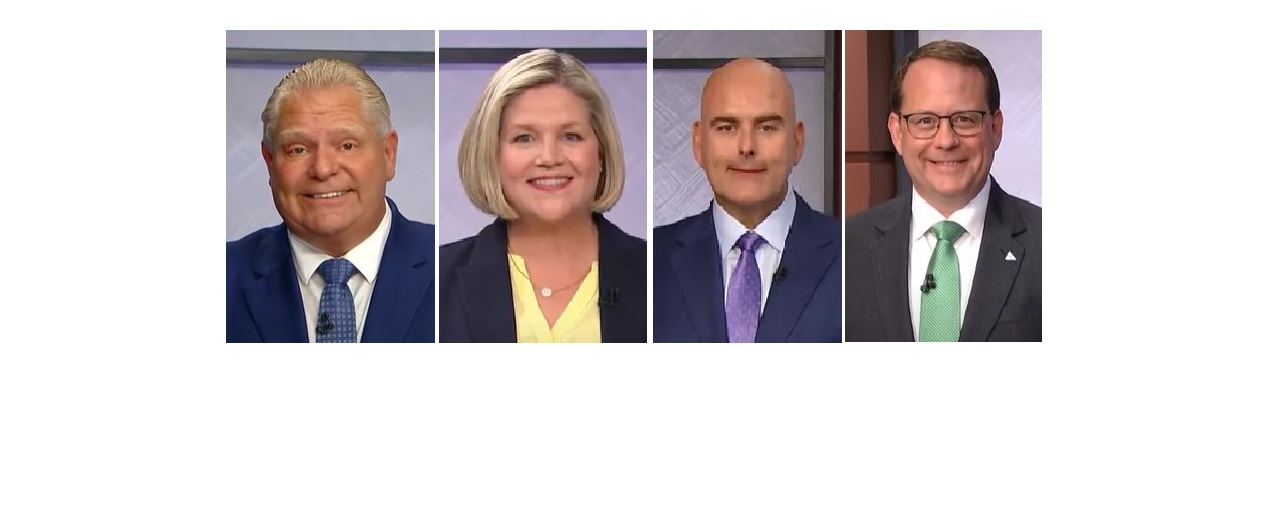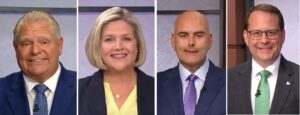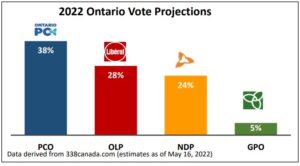No definitive winner in election debate
The only official debate in this election campaign gave Ontario’s four main party leaders the opportunity to discuss and debate their records. While the 90-minute debate (on May 16) did not solve any of the key issues in this election, it allowed those who tuned in the chance to better understand the direction of each party’s plan for the future of Ontario.
For decided voters, the event may have offered them confirmation and validation in their choice. However, those looking for a defining moment, something to help tip their decision one way or another, may still be searching for the right candidate to back.
All four leaders squared off and tackled some of the key issues which included topics on the economy, affordability, healthcare, education and leadership.
Depending who you ask, everyone has their own opinion in who won Monday’s debate. Regardless of one’s political persuasion, PC leader Doug Ford, stuck to the Party’s plan on building key highway infrastructure, cutting gas taxes and promoted a growing economy by keeping Ontario open.
The opposition was quick to criticize the Highway 413 project (estimated to cost $10 Billion), and Ford’s record over that past four years. Andrea Horwath focused on the NDP’s plan for housing affordability, the reintroduction of rent controls and bringing oil companies back under control but provided little detail as to how.
Meanwhile, Steven Del Duca, the Liberal Party leader, touted his Party’s 19-point affordability pledge. He referred to his family on several occasions, perhaps in and attempt to make himself more relatable to families and drove home the point that $10 B of taxpayers’ money would be better spend on investing in schools and education.
Although there was reference to Ford using his notes, he seemed prepared with facts and figures to support his record. On the topic of education, he pointed to the $14 B investments for school infrastructure and a plan to prepare students for jobs of the future including those in the skilled trades, technology and auto industry.
Green Party leader, Mike Schreiner appeared confident, professional and respectful. He focused on the climate crisis and finding new solutions to old problems. He even complimented the NDP for reforming their plan which also pledges to increase Ontario Disability Support Program and Ontario Works payments so that no one would be forced to live in legislative poverty.
When it comes to healthcare, almost all Ontarians can agree that better investments, clearing surgical backlogs and shorter wait times for those seeking mental health services are essential for the health and well-being of all residents. While his contenders criticized his handling of the Covid-19 pandemic, Ford stood his ground saying he “inherited a broken system”. He responded to criticism by saying that the PC’s are building hospitals and have a plan to fund nurses’ tuition fees if they work in underserved communities.
With another two weeks before election day (June 2), candidates still have time to convince voters, who may still be undecided, on how they should cast their ballot and for whom. According to 338Canada.com (May 16), a prediction model that considers all major polls, shows the PC maintain a lead at 38%. The Liberals, at 28%, trail by 10-points, followed by the NDP at 24%. The Green Party of Ontario hovers at 5%.





